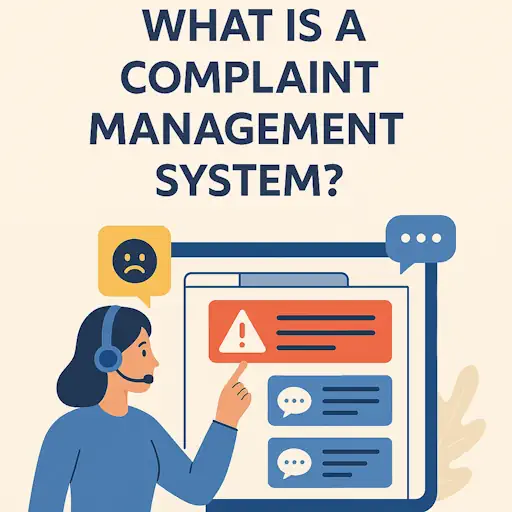What is a complaint management system?
A complaint management system is a structured solution designed to receive, track, investigate, and resolve customer complaints efficiently. It also provides insights to improve business processes and customer satisfaction.
9 Jun 2025
A complaint management system is a structured solution—often software-based—designed to receive, track, investigate, and resolve customer complaints efficiently, while also providing insights to improve business processes and customer satisfaction. As customer expectations for fast, transparent, and effective service rise, especially in the age of social media and instant feedback, organisations increasingly rely on these systems to maintain their reputation and comply with regulatory requirements.

Core Functions of a Complaint Management System
A complaint management system (CMS) centralises the entire complaints process, ensuring that every customer grievance is handled consistently and transparently from initial contact to final resolution. The system typically includes the following stages:
- Data Capture: The CMS logs complaints from various channels—phone, email, social media, live chat, or web forms—into a unified platform. This ensures no complaint is overlooked and allows customers to use their preferred communication method.
- Classification: Complaints are categorised based on type, severity, and urgency. This enables support teams to prioritise issues and allocate resources effectively.
- Investigation: The system provides support agents with all relevant customer information and complaint history, streamlining the investigation process and enabling faster, more accurate resolutions.
- Resolution and Fulfilment: Once a solution is identified, the system tracks its implementation, keeps the customer informed, and records the outcome for future reference.
- Insight and Reporting: CMS platforms generate reports on complaint trends, response times, root causes, and team performance. These insights help organisations identify systemic issues, improve products or services, and reduce future complaints.
Key Features and Benefits
Modern complaint management systems offer several features that enhance both customer and business outcomes:
- Automation: Routine tasks such as complaint logging, status updates, and notifications are automated, reducing manual workload and minimising errors.
- Integration: CMS platforms often integrate with other business systems like CRM, email, and social media, providing a 360-degree view of each customer and their interactions.
- Multi-Channel Support: Customers can submit complaints through any channel, with all data consolidated in one place for seamless handling.
- Self-Service Options: Some systems include customer portals where users can track the status of their complaints, further improving transparency and satisfaction.
- Compliance: For regulated industries, a CMS ensures that complaints are handled according to legal and industry standards, reducing the risk of fines or reputational damage.
Why Organisations Need a Complaint Management System
A robust complaint management system is essential for several reasons:
- Customer Satisfaction: Quick, consistent responses to complaints build trust and loyalty, turning negative experiences into opportunities for positive engagement.
- Operational Efficiency: Centralising and automating complaint handling reduces response times and allows teams to focus on complex issues.
- Continuous Improvement: By analysing complaint data, organisations can identify recurring issues and implement changes to prevent future problems.
- Reputation Management: Effective complaint resolution mitigates the risk of negative publicity, especially in the digital age where dissatisfied customers can easily share their experiences online.
Conclusion
A complaint management system is more than just a tool for handling grievances—it is a strategic asset that empowers organisations to listen to their customers, resolve issues efficiently, and drive continuous improvement. By transforming complaints into actionable insights, businesses can enhance customer loyalty, ensure compliance, and maintain a competitive edge in today’s demanding marketplace. Sign up for Emson today!